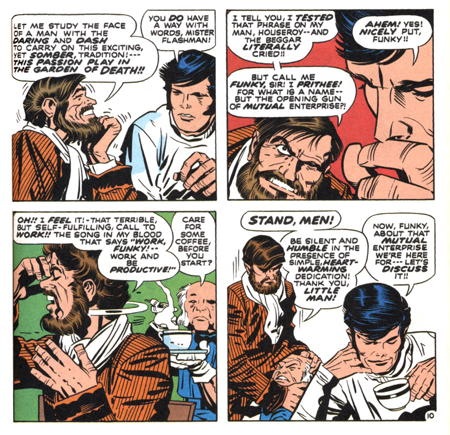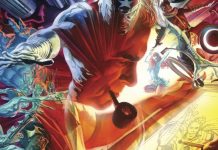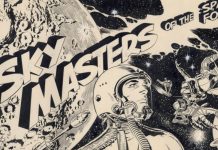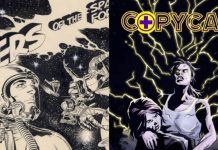§ Samurai Comics in Phoenix will be receiving comics ordered by bankrupt chain Atomic, according to an article surveying the retailing landscape. Owner Mike Banks said they will work with customers, Diamond, and other local shops to make sure that Atomic customers get their comics. “We’re looking at establishing a temporary spot in the East Valley where customers of the Mesa and Chandler Atomic Comics can come to get their new comics,” Banks told Vaneta Rogers. “Our Central Phoenix and West Valley location will have plenty of comics on hand to service those customers from the Paradise Valley and Metrocenter Atomic Comics locations.”
Other retailers cautioned not to take the end pf Atomic as a sign for other stores:
“I think there’s a tendency for people to jump to conclusions when individual businesses fail,” Field said. “The last three years have been a challenge for anyone who owns a business, whether it’s in the comic book business or not. And the fact that we are a very small industry, a less than $1 billion industry, makes things that much more difficult. There’s no room for error.”
Banks called the end of Atomic’s business “worrisome,” but agreed with Field that it’s not necessarily indicative of an end to the comic retailing business. “I don’t think this is a comic book industry issue alone, but is something small businesses across America are facing,” he said. “I would urge everyone to shop locally and try to help keep small businesses in your community afloat.”
No room for error.
§ Artist Marguerite Van Cook analyzes the Lee/Kirby/Marvel legal battles in terms of commerce and capitalism:
Another aspect of this debate, which has become so reductive in its claims of creative primacy, suggests that the idea is the only criteria for original creation. Even if hypothetically Lee originated characters, I would argue that where there is no previous model then the artist creates the image and reifies a concept. If there is no model to work from, then one must create the original figure, which henceforth will become that model. Pushed to a logical limit, one could point to the fact that though Bernini did not originate the myth of Apollo and Daphne, he certainly produced his original sculpture. His rendering of the narrative is creatively unique.
§ Finally, while we didn’t expect Chris Ware to rise to Grant Morrison’s bait, TCJ’s Dan Nadel picks up the gloves:
Seriously. I will admit, as Morrison totally predicted (tra la la, we’re all pretty predictable), that I found Supergods mostly not so great. Not because I didn’t understand what he was trying to do (Superheroes as modern myth; how the genre can have personal meaning) — I did. I even fully go in for the idea that there’s great life in the genre and that fantastic work has been and will be made. And on some subjects Morrison is great. His explanations of what makes Jim Starlin, Don McGregor, and other writers of the 1970s great is smart and concise. And his description of Image Comics and its place in the larger culture is the best I’ve ever read. But too often it comes back to new age silliness (Captain Marvel as “alchemical” hero) and self aggrandization (his relative fame, his oedipus complex with Moore) and then, finally, a long patch where he reels off his fave superhero movies (he was the only guy that liked Daredevil! Cool!). It is also is a book profoundly ignorant and dismissive of the actual circumstances under which his favorite toys were created, and fate of the toymakers. That said, I think it’s especially ironic that in the interview he randomly harps on Chris Ware and, TCJ (of course he’s right, we are smart asses) in economic/class terms. For someone so interested in class and vibes and making the world a better place, one might ask: Gee, Grant, what have you done to help out the economic situations of creators whose shoulders you stand on? Oh right. Nothing.
Nadel calls Morrison “out of touch,” and it is a bit dispiriting to see both Morrison and Moore expressing such apathy for anything that isn’t their own hobby horse. But heck, they have earned the right to be cranky old men.








For all this fun sniping, no one HAS brought up Batman Incorporated #7 which is the only bit of pop culture which covered life on Indian Reservations. That seems more important than this kind of thing, right? Grant Morrison mentioned it as the alternative to Chris Ware’s topics.
“Nadel calls Morrison “out of touch,” and it is a bit dispiriting to see both Morrison and Moore expressing such apathy for anything that isn’t their own hobby horse. But heck, they have earned the right to be cranky old men.”
What does this have to do with anything Moore has said? I don’t follow you, Heidi. Contrary to Morrison, I think Moore has shown great concern for the fate of the cartoonists of the past, and I’ve never seen him act as anything but a man of great integrity. Indeed, Moore was an early supporter of the movement for Kirby to have his artwork returned by Marvel. That he gets labeled as a “cranky old man” for voicing his justified and hard-earned opinions of the comics industry seems incredibly unfair.
While I like many of Morrison’s comics, the Rolling Stone interview is disappointingly self-serving… the man comes off as incredibly insecure.
Alex: SCALPED works that ground pretty well and is a damn fine crime comic.
Twenty years ago, I was in the Art Department at the University of Texas and Chris Ware was in some of my figure drawing classes. He was the finest draftsman I have ever seen work live. But he was never quite satisfied with his figure work.
Personally, I never got why a Renaisssance-level draftsman spent so much time drawing and painting Quimby. Maybe it makes him happy to do that kind of work.
If not being a fan of Chris Ware’s constant stream of “middle-class, white male whining about how hard his life is” stories is wrong, I don’t want to be right.
However, Nadel doesn’t address that aspect of Grant’s complaint about Ware. He makes a straw man argument and ad hominem attack instead.
Alex: Nadel was responding to an ad hominum atatck with an ad hominem attack.
Steven Stwalley: Oh yes Moore has absolutely been in front of the creators rights, but he is incredibly dismissive of anything going on in comics now — however he does like some bookstore stuff like Joe Sacco. So he’s a bit more in touch.
I think both could be a bit more open minded. But that said, I love them both just the way they are.
Morrison’s beef with Moore goes back to Moore specifically being a jerk to him and standing in the way of him getting work and threatening him. Morrison was a fan too once. When roles were later reversed, Morrison tried his best to be a mentor to a younger writer, Mark Millar. That backfired on him as well.
I disagree with Morrison on Ware but he’s entitled to his opinion. Ware is not for everyone. And I’ve been a Comics Journal reader for years. I loves me some “literary comics” but sometimes the world just needs some running and jumping and punching and fighting. Art form yes but entertainment is nice. In choosing between Morrison and Ware I’d say both.
I will say that Alan Moore was positively lovely when we were raising money for John Ostrander’s eye surgery.
As a classically trained draftsman, Ware’s stuff, to me, is just awe inspiring.
I always thought the Moore/Morrison beef started when Morrison wrote a bunch of hyper-critical articles about Moore’s work before Morrison began writing. Words were exchanged and the two have never been friendly since. (Moore probably should have had a thicker skin…I can see where that was Moore being a jerk.) I’ve never heard a word about Moore actively trying to stop Morrison from getting work.
Moore has *never* ever called out a specific creator the way Morrison has. He’s dismissed all of the current superhero comics with one general wave of his hand, sure, but he’s never been like, “You know who sucks? Chris Ware!”
I’ve heard a *lot* of good about Morrison and the beef with Moore probably started out by Moore being rubbed the wrong way by some of Morrison’s comments. That being said, what Morrison did by calling out Ware is just…dumb.
Has anyone considered that Morrison is feigning dickish-ness?
He’s always very conscious of managing his personal brand, so maybe he’s picking a safe target in order to generate some publicity and ingratiate himself with the anti-artsy crowd?
Did he “call out” Ware. Seemed to me like he just had an opinion.
Chris- The Morrison thing with Alan Moore goes way back, probably around 30 years. Long story short is Morrison actually started in comics close to the same time Moore did and they worked in some of the same UK magazines. I don’t know anything about Morrison writing articles about Moore. Morrison was both a comics writer and an artist at that time. Moore’s published career probably only pre-dates Morrison by about two or three years. People think Morrison started in the late 80s but he took a big chunk of the 80s off to play rock and/or roll.
Morrison was a fan of Moore’s. Morrison was offered Miracle Man (Marvel Man) after Moore left. Miracle Man was Morrison’s dream gig. Morrison had enough respect for Moore that instead of just taking the gig he asked for Moore’s blessing. Moore not only said no but threatened Morrison that his career was done if he did it. Morrison, did not do the book out of respect for Moore. But, I personally, can understand some bitterness there. Morrison was really young at the time and here is this guy the looks up to telling him to eFF off. (I think Gaiman took the gig.)
Flash forward to the late 80s. Moore becomes big in the US. DC brings in guys like Morrison and Gaiman. Morrison hits with Arkham Asylum. Gaiman hits with Sandman. It’s the “British invasion” or whatever. So, for the next 20 years of Morrison’s career, every time he does an interview he has to answer questions about the genius of Alan Moore all the while knowing Moore kept him off his dream gig. And for the most part over the past few decades or so Morrison has had really nice things to say about Alan Moore. He did an interview just a few weeks ago where he talked about how great V for Vendetta and Marvel Man were. But, at some point, when they keep asking the same questions, it has to get to a guy.
Moore is a full of contradictions. On the one hand, the Morrison story is an example of Moore holding back another writer. On the other you could say what he has done for creator’s rights has helped every writer. On the one hand, he gave all of his share of the movie/s money to the artists but on the other hand he goes out of his way to bad mouth (and literally curse) the movies which in turn probably did not help the artists make any extra money.
And let us never forget… Alan Moore wrote Spawn comics.
And, look at it this way, Alan Moore has had a falling out with Dave Gibbons. If you have had a falling out with Dave Gibbons you are doing something wrong.
As far as Millar goes. No one could ever be asked to bite their tongue as long and as hard as Morrison did trying not to reveal the truth about Millar.
None of this has any impact on the work as far as I’m concerned. The next time I read a Grant Morrison comic I promise you I will not be thinking about Alan Moore. The next time I read a Chris Ware comic, I will not be thinking of Grant Morrison.
Just curious… I’m not doubting what anyone may have heard and posted, but does anyone have credible references for what the Morrison/Moore conflict or conflicts were about? Like a first-hand interview or something? I’ve heard of their animosity for years, and I have heard so many different speculations on what caused it that I am highly skeptical of any stories about it I hear at this point. I get the feeling many of them have been created by a long, weird game of fanboy telephone.
The Miracleman thing was shown in Morrisons doc.
@Shannon Smith: I’m inclined to believe your account of what went down except for three things. 1) If you ‘think’ Gaiman took the Miracleman gig instead of knowing it, as Gaiman is a big part of the Miracleman story, it puts the rest of your account in jeopardy. 2) I’ve never read anything about Morrison in any of the Miracleman behind-the-scenes articles/books, though I’ll check my copy of Kimota!. 3) Morrison wrote Spawn comics too, so I’m not sure what your point is with that.
Gaiman did write Spawn too. As did Frank Miller.
They all got more than $100.000 for those 22 pages.
What’s the underhanded story about this?
@JeffF
I believe Shannon means “I think Gaiman took the gig” as he was offered the task instead of Morison, whereas actually the timings are out. Morison was offered to write Marvelman (and even then, I believe it would have been a Kid Marvelman story as opposed to continuing outright Moore’s story) towards the end of the life of Warrior, after the editor and Moore had a falling out. Moore continued to write Marvel Man for Eclipse, although renamed Miracleman after Marvel threatened to sue over the name, for several years with Gaiman taking over, with Moore’s blessing.
To play devils advocate, as I said above, Moore was angry at the Warrior editorial team at the time (although the specific reasons do escape me– it may have been at the capitulation toward Marvel that caused the renaming of the character) so I can understand why he’d have been angry at the thought of someone taking over writing one of ‘his’ characters, but the venom of his attack was a complete overreaction, in my opinion.
Pretty much everything else Shannon said is accurate (in as far as comics gossip is ever accurate, of course. I’ve read no end of comments detailing how Morrison doesn’t like Chris Ware’s work, while what I’ve read has actually been incredibly complimentary, with the exception of Morrison feeling that the downbeat nature of his stories is an indulgence of the affluent society that Ware lives in.
But then again, isn’t all art self indulgent? And isn’t all art open for criticism, as what actually is liked/disliked comes down to your personal reaction to things?
JeffF- I knew Gaiman wrote it but I was not sure he was the direct successor. Oscillating Wildely probably has the time frame right. I was thinking that Moore was on the book then off then back on so I don’t know who wrote what when. I was in the US reading GI Joe and X-Men comics at the time.
I was just cracking a joke about Spawn. If you look at Moore, Morrison or Gaiman’s resumes it just seems funny to me to see Spawn on there. Morrison and Millar worked on Vampirella as well.
Most of this is old news. Very old news in some cases. This stuff was talked about a lot in the early days of teh intronets message boards and places like Lying in the Gutters. “Back in the day”. Like I said, Morrison has answered these questions over and over and he usually plays nice. I guess the only reason it is coming up again now is because of his book Supergods. Which I have not read.